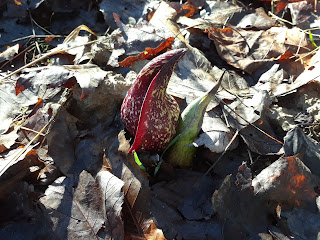We were the Leopards, the Lions;
those who’ll take our place will be
little jackals, hyenas;
and the whole lot of us, Leopards, jackals,
and sheep,
we’ll all go on thinking ourselves the salt of
the earth.
Giuseppe
Di Lampedusa, The Leopard
We haven’t the faintest idea what the Creek will be
like in a hundred years. Choose your power, God or Nature, if the distinction
matters to you. Because the only true answer is “God/Nature knows.” People don't, and never will.
All living spaces are always changing – as the space
of one’s own body is aging now, moving inexorably towards decomposition. So, the question is not whether or not Potomac
Creek would change. It is: How would leaving it alone affect the
Creek?
It's an appealing thought for some -- including me. But the effects of current human "management" would endure and likely never quite vanish. The damage is done, so to speak. The invasive species we "war" against now, like Japanese stiltgrass, emerald ash borers (a
beetle that feeds on ash trees), and more will continue to dramatically transform the
landscape. The Creek’s ash trees are already disappearing. In time, they would
likely to be replaced by other species shopping for a niche.
But consider this. Many
of us have heard of the chestnut blight of the early twentieth century, when
the fungus chryphonectria parasitica
destroyed in three decades up to half the trees in eastern hardwood forests.
Fewer of us know that the honeysuckle we picked as children is also an
invasive, introduced on Long Island, New York in 1806. And almost none of us is
aware that the common earthworm, like those used to fish for an invasive like
largemouth bass, is also an
invasive species. Glaciers of the Pleistocene Ice Age, which ended 10,000 years ago,
killed off native earthworms in much of America. The ones we typically see just north of the Creek arrived in the 1600s. Carried in the root balls and ship ballast of colonizing Europeans,
they burrowed into the soft ground. Both worms and humans permanently altered
the landscape from the soil up.
Nature abhors a vacuum, wrote Aristotle. Maybe. What's far more certain is that if nature has a center, it isn't us. We can no more manage Potomac Creek than leave it untouched.
 |
| Skunk cabbage. Photo R. Singh |





Comments
Post a Comment